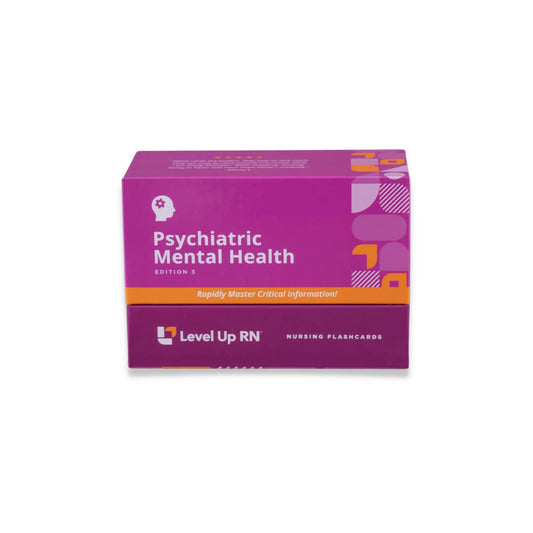Psychiatric Mental Health, part 18: Therapies - SSRIs & SSNRIs
Selective Serotonin Reuptake Inhibitors (SSRIs) and Selective Serotonin and Norepinephrine Reuptake Inhibitors (SSNRIs). Key medications that fall within these drug classes. The mode of action, interactions, and important side effects to know for SSRIs and SSNRIs.
Full Transcript: Psychiatric Mental Health, part 18: Therapies - SSRIs & SSNRIs
Full Transcript: Psychiatric Mental Health, part 18: Therapies - SSRIs & SSNRIs
Hi, I'm Cathy with Level Up RN. In this video, we will be discussing key medications that are used to treat anxiety and depression. This includes selective serotonin reuptake inhibitors, or SSRIs, as well as selective serotonin and norepinephrine reuptake inhibitors, or SSNRIs. At the end of the video, I'm going to give you guys a little quiz to test your knowledge of some of the key points I'll be covering. So definitely stay tuned for that. And if you have our Level Up RN Psychiatric Mental Health Nursing Flashcards, definitely pull those out so you can follow along with me. Selective serotonin reuptake inhibitors, or SSRIs, include medications such as paroxetine, sertraline, and fluoxetine. These medications are used to treat anxiety, depression, OCD, as well as PTSD. And you'll notice that many medications in this class end in tine, so T-I-N-E, or line, L-I-N-E. These medications inhibit the reuptake of serotonin, which increases the amount of circulating serotonin in the brain. A key interaction with SSRIs is St. John's wort, which is a very common herbal supplement. St. John's wort also increases levels of serotonin, so this places the patient at risk for serotonin syndrome. Signs and symptoms of serotonin syndrome include agitation, fever, muscle rigidity, tachycardia, nausea and vomiting, as well as diaphoresis. Common side effects of SSRIs include sexual dysfunction, weight gain, and insomnia, and full effects may not be felt for several weeks.
Moving on now to selective serotonin and norepinephrine reuptake inhibitors, or SSNRIs. Medications that fall within this class include duloxetine and venlafaxine. Medications in this class are used to treat anxiety, depression, as well as neuropathic pain. Our cool chicken hint to help you remember at least one of these medications is I don't need a deluxe apartment to be happy, I just need to take duloxetine for my depression. These medications inhibit the reuptake of both serotonin and norepinephrine, which increases the amount of these neurotransmitters in the brain. So just like with SSRIs, St. John's wort is a key interaction. So if St. John's wort is taken with an SSNRI, this will increase the risk for serotonin syndrome. Important side effects to know include fatigue, insomnia, GI upset, such as nausea and constipation, as well as decreased libido.
All right. It's quiz time, and I've got three questions for you. Question number one. Patients can expect to feel the full effects of an SSRI within three to five days. True or false? The answer is false. It can take several weeks or more to feel the full effects of an SSRI. Question number two. Taking St. John's wort with an SSRI or SSNRI increases the risk of what serious complication? The answer is serotonin syndrome. Question number three. Sexual dysfunction is a common side effect of SSRIs and SSNRIs. True or false? The answer is true. All right. That is it for this video. I hope you did great on that quiz, and I hope you found this information to be helpful. If so, be sure to hit that like button. Take care and thank you so much for watching.


